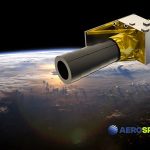Throughout their newly signed agreement, Arquimea and Aerospacelab will co-develop a satellite platform, optimised for power and reliability.
 Arquimea and Aerospacelab have announced the collaboration agreement at the 37th edition of the Small Satellite Conference, held at Utah State University from August 5 to 10.
Arquimea and Aerospacelab have announced the collaboration agreement at the 37th edition of the Small Satellite Conference, held at Utah State University from August 5 to 10.
The new co-developed satellite will be highlighting optimised reliability and power management. It will deliver 1.5 kW of peak power and will be able to integrate payloads of 40 kg. The satellite performance will meet the growing demand for LEO missions, such as telecommunications constellations, synthetic aperture radar, Earth observation and other applications requiring high reliability and on-board satellite processing capabilities.
Throughout this collaboration agreement, both companies will pool their experience and know-how to also capture business opportunities that may arise on the global market.
In this regard, Aerospacelab brings to the table its experience in the development of satellites with a modular design, which allows for scalability and redundancies in critical subsystems. For its part, Arquimea will add technological know-how and experience in the design and manufacture of thermal systems and structures, optical systems, avionics, deployable systems, and aerospace-grade microelectronics. In addition, both companies operate state-of-the-art facilities to manufacture this new high-performance satellite model in large series at a combined rate of up to 100 units per year.
Benoit Deper, CEO and founder of Aerospacelab, said: “In Arquimea we have found the ideal partner to carry out an ambitious global project which perfectly complements our current product portfolio. This collaboration and newly co-developed satellite will not only address a market segment with great potential, but it will also further strengthen our capabilities to contribute to shaping the future of the space industry.”
Ferran Tejada, CEO of Arquimea Space, added: “We offer a more technologically advanced solution to respond to the growing demand for increasingly complex and exacting LEO missions, both for individual satellites and constellations. With this collaboration, we continue to expand our capabilities and technologies that reinforce our position as a benchmark technology company at all levels of the space value chain.”
The agreement between both companies also provides for collaboration on future projects and opportunities to develop turnkey space missions. These services include mission definition for satellites weighing up to 300 kg and constellations, including their design and manufacture, launch and operation.











































































